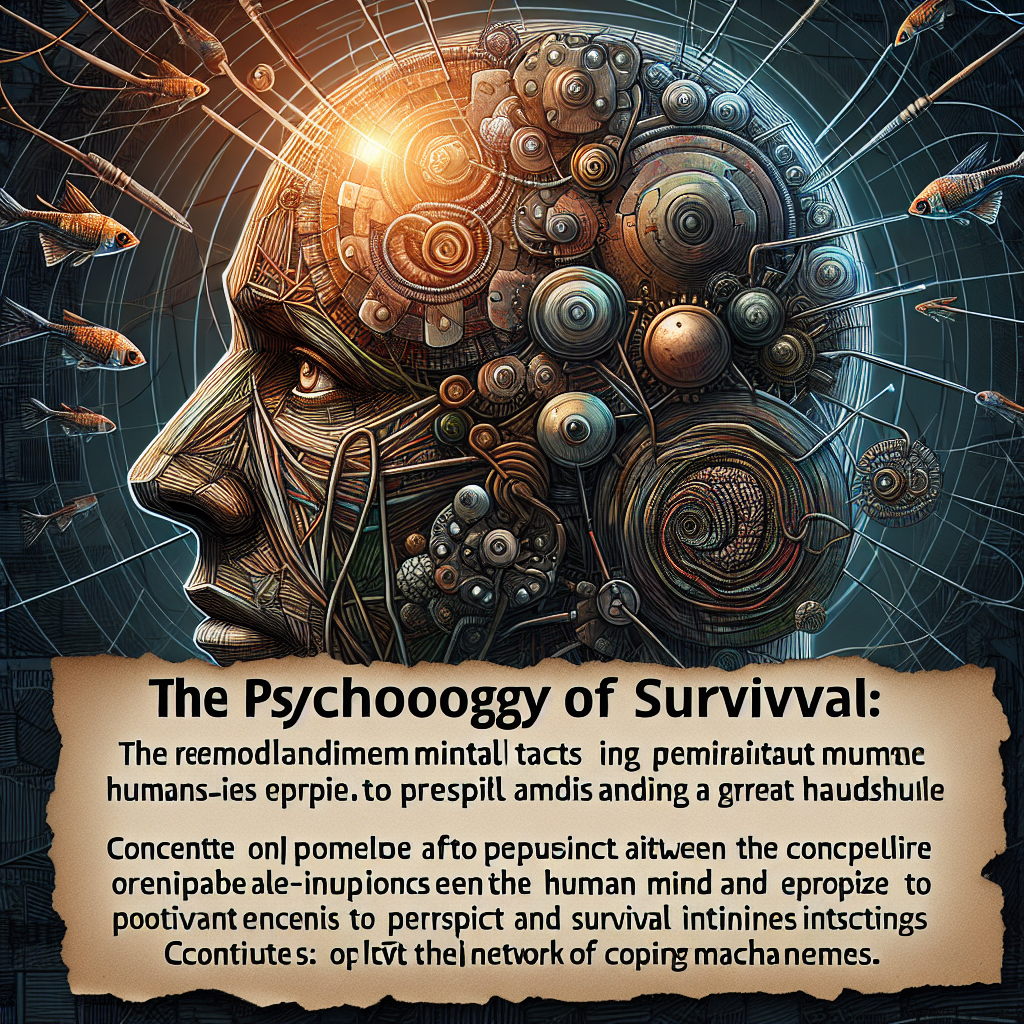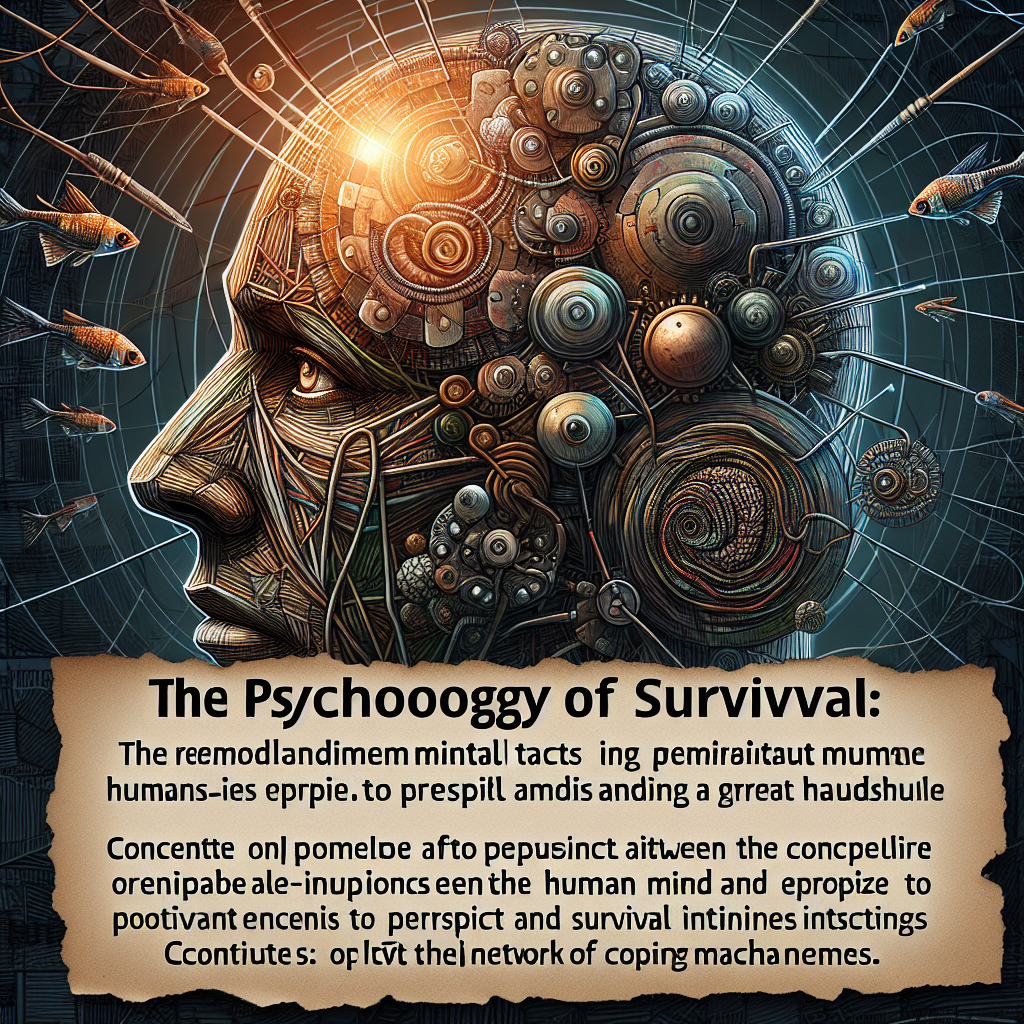In this fascinating article, discover the psychology of survival and the intricate coping mechanisms that humans employ in the face of adversity. Delving into the depths of the human psyche, we examine the innate qualities that enable us to endure and overcome challenging circumstances. From the power of resilience to the importance of adapting in the face of change, this exploration sheds light on the remarkable strength and resilience that lies within us all. Prepare to be captivated as we unravel the complexities of our psychological survival toolkit.

Survival and Coping Mechanisms
Survival situations can be incredibly challenging, both physically and mentally. When faced with adversity, it is crucial to have effective coping mechanisms in place to navigate and overcome the difficulties. Coping mechanisms refer to the strategies and techniques individuals use to manage stress, regulate emotions, and adapt to their circumstances. In a survival situation, these coping mechanisms play a vital role in increasing resilience and improving the chances of survival.
The Importance of Coping Mechanisms in Survival Situations
Having effective coping mechanisms is essential in survival situations for several reasons. Firstly, coping mechanisms help individuals maintain a sense of control and reduce feelings of helplessness. This is particularly important in life-threatening situations, as a sense of control can enhance decision-making and problem-solving abilities. Additionally, coping mechanisms can help individuals regulate their emotions, reducing feelings of fear, anxiety, and panic that can impair judgment and decision-making. Lastly, coping mechanisms promote adaptability and flexibility, enabling individuals to adjust to changing circumstances and make effective use of available resources.
Understanding the Psychological Processes in Survival
Survival situations trigger a range of psychological processes that affect an individual’s behavior and well-being. The stress response, for example, is a natural physiological and psychological reaction to perceived threats or danger. In survival scenarios, this stress response can be activated, leading to increased heart rate, heightened alertness, and heightened emotional arousal. Understanding these processes is crucial for developing effective coping mechanisms that alleviate stress, promote resilience, and enhance survival chances.
Impact of Stress on Coping Mechanisms
Stress can significantly impact an individual’s coping mechanisms, often leading to maladaptive behaviors and reduced functioning. Prolonged exposure to stress can exhaust cognitive resources, impair decision-making, and increase vulnerability to mental health disorders such as anxiety and depression. Therefore, it is essential to develop coping mechanisms that effectively manage stress and prevent its detrimental effects.
Cognitive Coping Mechanisms
Cognitive coping mechanisms focus on managing and altering one’s thoughts and perceptions in survival situations. These mechanisms provide individuals with a mental framework to understand their circumstances, problem-solve, and regulate emotions effectively.
Problem-Focused Coping
Problem-focused coping involves actively addressing the challenges and problems encountered in survival situations. This approach emphasizes problem-solving skills, critical thinking, and seeking practical solutions. For example, if you find yourself lost in the wilderness, problem-focused coping may involve creating a plan to navigate back to civilization or identifying alternative sources of food and water.
Emotion-Focused Coping
Emotion-focused coping strategies target the emotional distress that can arise during survival situations. Rather than directly addressing the challenges, this approach focuses on managing and regulating emotions to reduce distress and improve well-being. This may involve techniques such as deep breathing, meditation, or engaging in activities that promote relaxation and stress reduction.
Cognitive Restructuring
Cognitive restructuring involves challenging and modifying negative and irrational thoughts that may arise during survival situations. By replacing negative thoughts with more positive and rational ones, individuals can enhance their problem-solving abilities and reduce emotional distress. Cognitive restructuring techniques may include identifying cognitive distortions, reframing negative thoughts, and practicing positive self-talk.
Social Coping Mechanisms
Social coping mechanisms are centered around seeking and utilizing support from others in survival situations. These mechanisms recognize the value of interpersonal connections and the benefits of cooperating with others during challenging circumstances.
Social Support and Survival
Social support plays a crucial role in survival situations by providing individuals with emotional, informational, and instrumental assistance. Maintaining social connections and seeking support from others can alleviate feelings of isolation, provide a sense of belonging and security, and enhance problem-solving abilities. In survival scenarios, relying on others for emotional support, sharing resources, and collaborating can greatly increase the chances of survival.
Cooperation and Shared Responsibility in Survival Situations
Cooperation and shared responsibility are fundamental social coping mechanisms in survival scenarios. By working together, individuals can pool their strengths, skills, and resources, enhancing overall survival prospects. Cooperation may involve sharing tasks and responsibilities, coordinating efforts, and supporting and assisting one another. This collaborative approach not only increases the chances of survival but also fosters a sense of community and mutual support.
Emotional Coping Mechanisms
Emotional coping mechanisms focus on regulating and managing emotions during survival situations. These mechanisms help individuals navigate the emotional challenges that arise in high-stress and life-threatening circumstances.
Emotional Regulation in Survival Scenarios
Emotional regulation involves the ability to identify, understand, and manage one’s emotions effectively. In survival situations, individuals may experience a wide range of emotions, from fear and anxiety to sadness and frustration. Being able to regulate these emotions is vital for clear thinking, decision-making, and problem-solving. Techniques such as mindfulness, deep breathing, and focusing on positive emotions can help individuals regulate their emotions in survival scenarios.
The Role of Hope and Optimism
Hope and optimism play a significant role in coping with survival situations. Having a positive mindset and maintaining hope in the face of adversity can enhance resilience, motivation, and perseverance. Believing in the possibility of a positive outcome can provide individuals with the strength and determination to overcome challenges and seek solutions. Additionally, optimism can help individuals maintain a sense of control and reduce feelings of helplessness.
Psychological Resilience in Survival
Psychological resilience refers to an individual’s ability to cope with and bounce back from adversity. In survival situations, psychological resilience enables individuals to adapt to changing circumstances, remain focused, and maintain a positive outlook. Building psychological resilience involves developing coping strategies, cultivating social support networks, and fostering a sense of purpose and meaning.

Adaptive Coping Mechanisms
Adaptive coping mechanisms focus on maintaining a positive mindset, utilizing available resources effectively, and adapting to changing circumstances in survival situations.
Maintaining a Positive Mindset
Maintaining a positive mindset is crucial in survival situations as it can enhance problem-solving abilities, motivation, and resilience. By focusing on positive aspects, individuals can maintain hope, reduce stress, and remain proactive. Techniques such as gratitude exercises, visualization, and positive self-talk can help individuals maintain a positive mindset.
Identifying and Utilizing Available Resources
Adaptive coping involves identifying and utilizing the resources available in survival situations. This can include utilizing tools, equipment, and supplies, as well as making use of natural resources in the environment. Being resourceful and creative in finding solutions can significantly impact an individual’s survival chances.
Flexibility and Adaptability in Survival
Flexibility and adaptability are critical coping mechanisms in survival situations that involve uncertainty and rapidly changing circumstances. Being open to new ideas, adjusting strategies, and embracing change can help individuals navigate challenges effectively. Flexibility also involves being able to let go of rigid expectations and adapting to the realities of the situation.
Maladaptive Coping Mechanisms
Maladaptive coping mechanisms are strategies that individuals may use in survival situations that are ineffective or even detrimental to their well-being and survival prospects.
Avoidance and Denial
Avoidance and denial involve ignoring or avoiding the challenges and difficulties in survival situations. While this may provide temporary relief from stress, it hinders problem-solving and can lead to further complications. Ignoring the realities of the situation may prevent individuals from seeking necessary help and taking appropriate actions.
Substance Abuse as a Coping Mechanism
In some survival situations, individuals may turn to substances such as alcohol or drugs as a means of escape or coping. However, substance abuse can impair judgment, physical abilities, and decision-making, further endangering an individual’s survival chances. It is essential to recognize the risks associated with substance abuse and seek healthier coping mechanisms.
Isolation and Social Withdrawal
Isolation and social withdrawal can be detrimental in survival situations as they limit access to resources, support, and cooperation. While it is natural to feel overwhelmed or seek solitude during challenging times, isolating oneself for extended periods can increase feelings of loneliness, decrease motivation, and hinder problem-solving abilities. It is important to strike a balance between solitude and seeking support from others.
Developing Coping Mechanisms for Survival
Developing effective coping mechanisms for survival situations requires proactive effort and preparation. By developing resilience and coping strategies, individuals can increase their chances of successfully navigating and overcoming challenges.
Building Resilience through Stress Inoculation
Stress inoculation refers to the process of gradually exposing oneself to stressful situations, allowing for the development of resilience and adaptive coping mechanisms. By gradually increasing exposure to stressors, individuals can build resilience, enhance problem-solving skills, and learn to manage their emotions effectively. This can be done through various techniques such as visualization, role-playing, and controlled exposure therapy.
Training and Education in Coping Strategies
Training and education in coping strategies can equip individuals with the knowledge and skills necessary to manage stress and navigate survival situations effectively. This can involve learning techniques such as mindfulness, problem-solving, and emotional regulation. By acquiring these skills, individuals can increase their preparedness and ability to cope in challenging circumstances.
Therapeutic Interventions for Developing Coping Mechanisms
In some cases, therapeutic interventions may be necessary to develop effective coping mechanisms for survival situations. Therapy can provide individuals with a safe space to explore their emotions, process traumatic experiences, and develop practical strategies for coping. Therapists can offer guidance, support, and evidence-based interventions to promote psychological well-being and resilience.
Cultural and Individual Differences in Coping
Coping mechanisms can vary significantly across cultures and individuals. Cultural influences shape the values, beliefs, and norms surrounding coping behaviors. For example, collectivist cultures may place a greater emphasis on social support and cooperation, whereas individualistic cultures may prioritize self-reliance and problem-solving. Additionally, individuals may have unique coping styles influenced by their personality traits, upbringing, and past experiences. Recognizing and respecting these differences is crucial when working in diverse survival scenarios.
Cultural Influences on Coping Mechanisms
Cultural influences shape the coping mechanisms individuals employ in survival situations. Cultural norms, values, and beliefs impact how individuals perceive and respond to stress, as well as the resources and strategies they rely on. Understanding and respecting cultural differences can enhance collaboration and effective problem-solving in diverse survival scenarios.
Personality Traits and Coping Styles
Personality traits also influence coping styles in survival situations. Some individuals may naturally possess characteristics such as resilience, optimism, and adaptability, making them more adept at coping with challenges. Others may demonstrate traits that hinder effective coping, such as pessimism or impulsivity. Recognizing and understanding these individual differences can help tailor coping strategies and interventions to individual needs.
The Role of Perception in Coping Mechanisms
Perception plays a crucial role in the effectiveness of coping mechanisms in survival situations. How individuals perceive control and threat impacts their coping strategies and behaviors.
Perception of Control and Coping
A sense of control is essential for effective coping in survival situations. Believing that one has control over their circumstances empowers individuals to take action, make decisions, and seek solutions. By enhancing perceived control, individuals can reduce feelings of helplessness and increase confidence in their ability to cope.
Perception of Threat and Coping Strategies
Perception of threat influences the choice and effectiveness of coping strategies. Individuals who perceive survival situations as highly threatening may be more prone to panic, anxiety, or avoidance strategies. On the other hand, individuals who perceive threats as challenging may adopt problem-focused coping strategies and exhibit resilience. It is crucial to manage and reshape perceptions of threat to enable effective coping.
Conclusion
Survival situations present unique challenges that require effective coping mechanisms to navigate and overcome. Understanding the psychological processes involved, such as stress and resilience, is crucial for developing coping strategies. Cognitive, social, and emotional coping mechanisms provide individuals with the tools to regulate emotions, problem-solve, and maintain a positive mindset. Adaptive coping mechanisms foster flexibility, resourcefulness, and adaptability. Avoiding maladaptive coping mechanisms and seeking therapeutic interventions when necessary can significantly impact survival prospects. Building resilience through stress inoculation, training, and education can enhance coping abilities. Recognizing cultural and individual differences in coping styles and understanding the role of perception further improves coping strategies. By developing and utilizing these coping mechanisms, individuals can increase their chances of survival and successfully navigate challenging circumstances.

